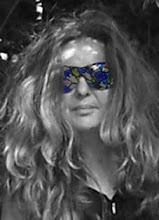
Balada de la naranja y la uva
Después de terminar tu trabajo
de acabar tu jornada
de haber leído tu lectura
y escrito lo tuyo -
bajas a la calle hasta el puesto de perritos calientes,
a una manzana de aquí en la otra acera.
Una tarde sofocante en el Este de Harlem, en el siglo XX.
La mayoría de las ventanas están tapiadas,
las ratas huyen de un saco -
saliendo de un garaje de mala muerte
un Cadillac largo y brillante;
junto a la puerta de cristal del centro de drogadictos,
un hombre a quien le gustaría romperte la espalda.
Pero también hay una mujer morena con una niña vestida de rosa.
Salchichas, salchichas chisporrotean en la plancha
en la que se inclina el vendedor de perritos calientes
- en el mostrador no había nada más
que las dos máquinas de siempre,
la de zumo de uva, vacía, y la de naranja, vacía,
y yo frente a él entre los dos aparatos.
Un muchacho negro llega, mira los perritos calientes, y sigue su camino.
Miro al hombre que está de pie y echa
como de costumbre
el líquido de color púrpura brillante donde dice NARANJA
el de color anaranjado donde dice UVA,
el zumo de uva en la máquina de NARANJA
y el zumo de naranja en la de la UVA.
Sólo una palabra grande y clara, inconfundible, en cada máquina.
Le pregunto: ¿Cómo podemos seguir leyendo
y encontrar sentido a lo que leemos? -
¿Cómo pueden escribir y creer lo que escriben,
los jóvenes de la acera de enfrente,
si usted echa uva en NARANJA
y naranja donde dice UVA -?
(¿Cómo vamos a creer lo que leemos y escribimos y oímos, lo que decimos y lo que hacemos?)
Mira a las dos máquinas y sonríe
se encoge de hombros sonríe y sigue echando.
Podría ser violencia y no violencia
podria ser hombre y mujer blanco y negro
podria ser guerra y paz o cualquier
sistema binario, amor y odio, enemigo, amigo.
Sí y no, ser y no ser, lo que hacemos y lo que no hacemos.
En una esquina en el este de Harlem
basura, lectura, una gran sonrisa, violación,
olvido, una calle de crimen,
miseria, esperanza marchita,
un hombre sigue echando uva en NARANJA
y naranja donde dice UVA,
echando naranja en UVA y uva en NARANJA siempre.
Ballad of Orange and Grape
After you finish your work
after you do your day
after you've read your reading
after you've written your say —
you go down the street to the hot dog stand,
one block down and across the way.
On a blistering afternoon in East Harlem in the twentieth century.
Most of the windows are boarded up,
the rats run out of a sack —
sticking out of the crummy garage
one shiny long Cadillac;
at the glass door of the drug-addiction center,
a man who'd like to break your back.
But here's a brown woman with a little girl dressed in rose and pink, too.
Frankfurters, frankfurters sizzle on the steel
where the hot-dog-man leans —
nothing else on the counter
but the usual two machines,
the grape one, empty, and the orange one, empty,
I face him in between.
A black boy comes along, looks at the hot dogs, goes on walking.
I watch the man as he stands and pours
in the familiar shape
bright purple in the one marked ORANGE
orange in the one marked GRAPE,
the grape drink in the machine marked ORANGE
and orange drink in the GRAPE.
Just the one word large and clear, unmistakable, on each machine.
I ask him: How can we go on reading
and make sense out of what we read? —
How can they write and believe what they're writing,
the young ones across the street,
while you go on pouring grape into ORANGE
and orange into the one marked GRAPE —?
(How are we going to believe what we read and what we write and we hear and we say and we do?)
He looks at the two machines and he smiles
and he shrugs and smiles and pours again.
It could be violence and nonviolence
it could be white and black women and men
it could be war and peace or any
binary system, love and hate, enemy, friend.
Yes and no, be and not-be, what we do and what we don't do.
On a corner in East Harlem
garbage, reading, a deep smile, rape,
forgetfulness, a hot street of murder,
misery, withered hope,
a man keeps pouring grape into ORANGE
and orange into the one marked GRAPE,
pouring orange into GRAPE and grape into ORANGE forever.
Muriel Rukeyser (1913–1980)













2 comentarios:
Gracias Elena por traernos este sentido poema.
Me recuerda a la precariedad a la que se enfrentan muchas familias españolas.
Un abrazo
Un abrazo, Maria.
Publicar un comentario